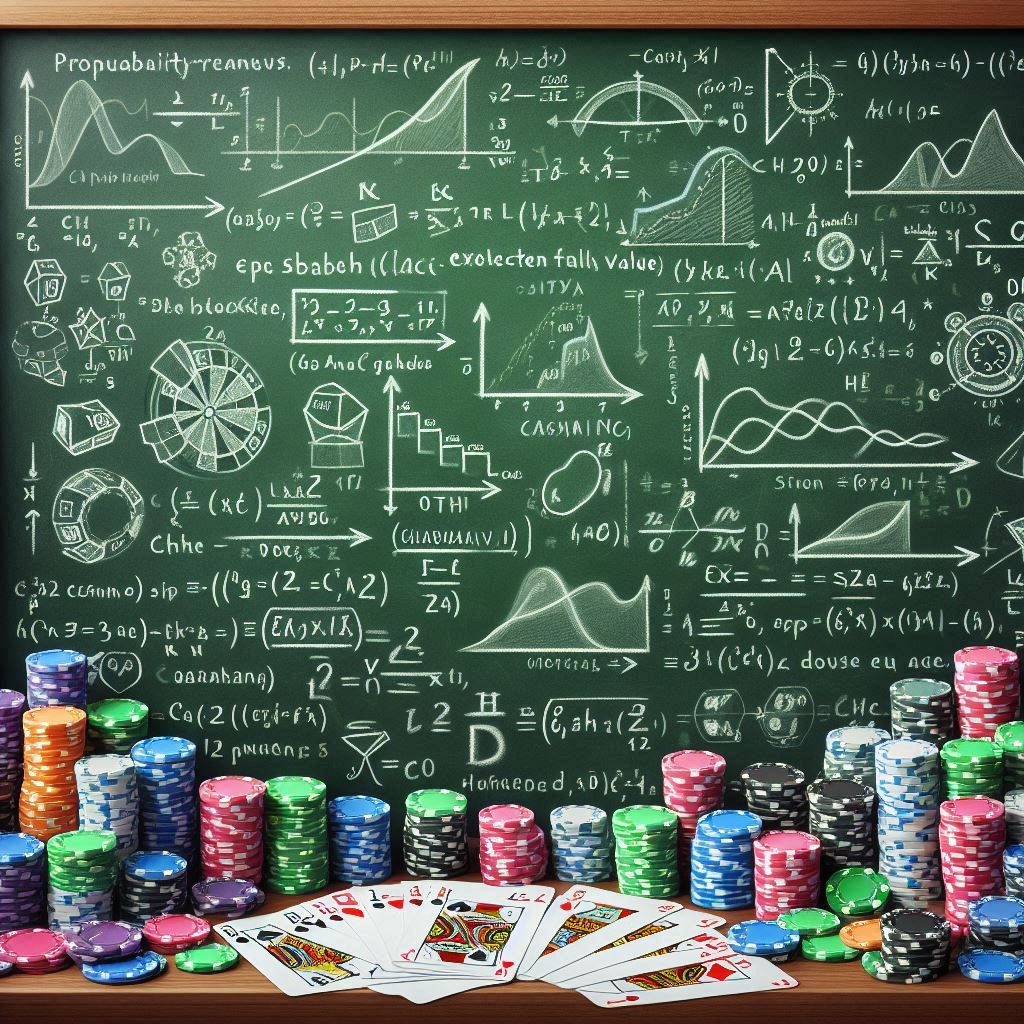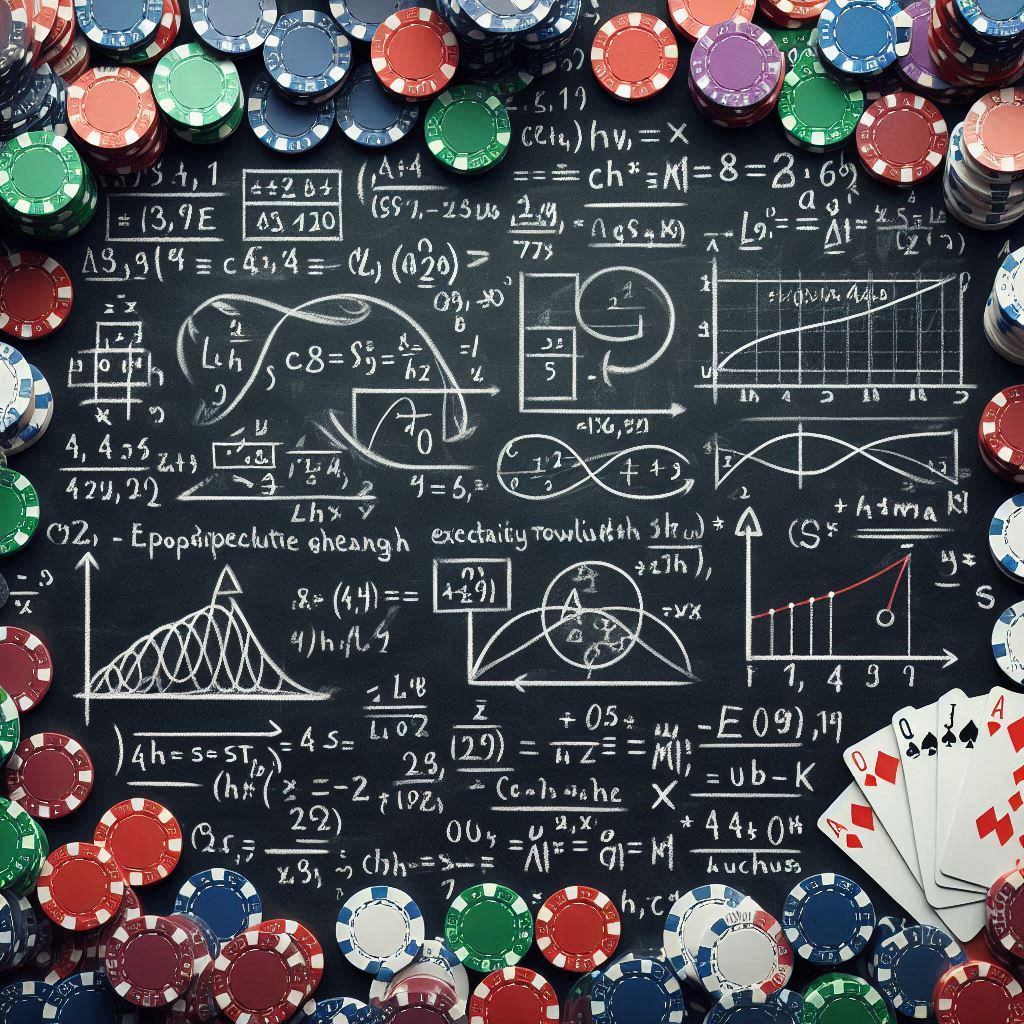The Math of Casino Games
Odds and Probability

Probability measures the likelihood of a particular event occurring. This could refer to the chance of drawing a certain card, rolling a particular number, or landing a specific symbol on a slot machine. Probability is expressed as a fraction or a percentage. The probability of rolling a four with a single six-sided die is 1/6 or approximately 16.67%. The calculation of probabilities in card games depends on the structure of the game and the number of decks used. In a standard deck of 52 cards, the probability of drawing an Ace as the first card is 4 out of 52, as there are four Aces in a deck. Once the Ace is drawn, the deck is left with 51 cards, affecting the probabilities of subsequent draws.
While probability focuses on the likelihood of an event occurring, odds describe the ratio of success to failure. This directly influences betting strategies. Odds are often expressed in several ways, including fractional (e.g., 5 to 1), decimal (e.g., 6.0), or American (e.g., +500). If a game offers 5 to 1 odds on a certain bet, this means for every 1 unit bet, the player can win 5 units if successful. It suggests that out of six possible outcomes, success is expected only once, with five potential failures. Understanding these nuances helps players make more informed decisions about where to place their bets.
Deciphering the House Edge
The house edge is a statistical way to measure the casino’s advantage over the player. It is defined as the average gross profit the casino expects on a particular game. The exact percentage indicates the expected return to the casino over time. A house edge of 2% suggests that for every $100 wagered at the casino, it expects to make $2 in profit.
It is calculated based on the payout for each type of bet and the probability of each outcome. In American roulette, even though the payouts do not represent true statistical probabilities due to the inclusion of 0 and 00, the structure forms the basis for the house edge. Given that roulette pays out 35:1 for a bet on a single number but the odds of hitting a number are 1 in 38, the discrepancy between these figures creates the house edge.
Games with a lower house edge, like blackjack or baccarat when played following basic strategy guidelines, offer a more favorable outcome in terms of potential return to the player compared to games with a higher house edge like keno or some forms of slots.
In blackjack, the house edge can be reduced through strategic play such as card counting and adhering to the basic strategy. These methods trim down the casino’s advantage significantly.
The house edge assures the casino’s commercial viability by offsetting the costs associated with running gaming activities, including staffing, maintenance, and administrative expenses. Accurately understanding the house edge of various games can help players better manage their bankroll and improve their decision-making processes. It encourages a disciplined approach to gambling, where decisions are made based on statistical insights rather than impulsive gambling urges.
Blackjack Basic Strategy and Card Counting
The basic strategy in blackjack is a system of decisions proven statistically to provide the optimal play for any given situation in the game. It leverages the potential outcomes based on the player’s hand and the dealer’s visible card. The basic strategy is designed to manage the risks and capitalize on the opportunities presented during the game.
The strategy gives an idea of when to hit, stand, double down, split, or fold. The decisions are based on maximizing the player’s chances of winning and minimizing the expected losses. Effective basic strategy requires memorization of the strategy chart, which outlines the optimal moves in different scenarios. With practice, players can quickly learn to make the right decisions automatically.
Card counting is a technique that adjusts the bet size based on the composition of the deck. The main idea behind card counting is that high cards (10, Jack, Queen, King, Ace) are generally more beneficial for the player, while low cards (2-6) are better for the dealer. Tracking the ratio of high to low cards that have been played, a card counter attempts to gauge the likelihood of winning future hands.
Using a simple system like Hi-Lo, high cards might be assigned a value of -1 and low cards a value of +1. As cards are exposed, the counter adds or subtracts according to these values, and the running count informs the player about the remaining thick or thin density of valuable cards.
If the count is positive and suggests a surplus of high-value cards, the player can increase their bets accordingly, expecting a higher chance of hitting blackjack or a high total. If the count is negative, minimal bets are advisable.
Martingale System in Roulette
The Martingale System operates on a progressive betting mechanism where a player doubles their bet after each loss. The objective is to recover previous losses and achieve a profit equal to the initial bet upon eventually winning a spin. The idea revolves around the probability of losing several times in succession being low, which theoretically should assure eventual victory.
In the traditional application of the Martingale System, a player might begin by betting a small amount on an even-money bet such as red or black. If the bet loses, the strategy dictates that the bet should be doubled. This process repeats until a win occurs. Following a win, the player returns to their initial stake and begins the process again.
The advantage of the Martingale System is that it is simple and methodical, providing a clear plan after every game outcome. It appeals especially to those who favor systematic play over intuitive decision-making.
The nature of this system requires a substantial bankroll. Doubling bets can exhaust a player’s funds quickly, particularly during an extended losing streak. Starting with an initial bet of $10, six consecutive losses would require the seventh bet to be $640, an amount that is substantial relative to the initial bet.
Casinos safeguard themselves against the potential exploitation of such systems through table limits. These limits prevent the player from doubling their bets indefinitely, effectively blunting the strategy of the Martingale System. When a player reaches the table limit, they no longer have the option to continue doubling down, which can lead to substantial unrecoverable losses.
The system operates under the assumption that a win will eventually occur, which may not always realistically reflect the outcomes within a given playing session. Roulette’s inherent house edge ensures that the probability always slightly favors the casino, and over extended periods, the house edge asserts itself independent of betting strategies used.
Tips for Playing Slots
Each spin is completely independent, governed by a random number generator (RNG). The RNG ensures that each spin is random and not influenced by previous outcomes. This means that the probability of hitting a jackpot remains constant each time, irrespective of the results of earlier spins.
Players should look for machines with a higher Return to Player (RTP) percentage. The RTP indicates the percentage of wagered money the slot machine will pay back to players over time, where a higher RTP means better potential returns. A slot machine with an RTP of 96% is expected to return $96 for every $100 wagered. Information on RTP is usually available in the game’s help section or online reviews.
Determine the total amount you are willing to spend before you start playing and stick to this budget. It is advisable to choose machines that allow for longer play sessions at lower costs per spin, which can maximize entertainment value and increase your chances of hitting a payout.
Many casinos offer bonuses and promotions that can be used on slots. These may include free spins or bonus cash which can extend your playtime without additional cost. Always read the terms and conditions associated with any bonuses to ensure you understand the wagering requirements and game restrictions.
The most important strategy for any form of gambling is knowing when to stop. This applies particularly to slot machine play, where the rapid pace can result in quickly depleting your bankroll. Set the clear win and loss limits before you begin playing. After you reach these limits, it’s wise to stop playing to ensure you protect your bankroll and winnings.

